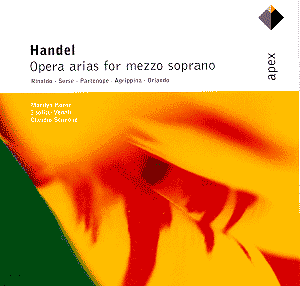"Arias for mezzo soprano", it says,
and authentically minded readers may already have noted that most
of them would be sung by a countertenor these days, being originally
for castrati. A little while ago I reviewed a record, "Arias
for Farinelli", by Vivica Genaux, which came with a fascinating
essay by René Jacobs in which he argued that the nearest
we can get these days to the sound of the castrati is not the
countertenor, which he rudely says should really be called a "falsettist",
but the mezzo soprano, who is able to reproduce the strong, warm
chest tones in her lower range which contemporary commentators
tell us were at the base of the castrato voice production, the
voice becoming sweeter and softer as it goes into the higher range.
With all due respect for Vivica Genaux’s not inconsiderable achievement,
I think Marilyn Horne proves the point rather better. The sheer
butch power and richness of her lower chest notes could easily
kid you that a man is singing (interestingly in "Lascia ch’io
pianga", where she is actually singing a female role, she
avoids using the chest tones on the lower notes), and her middle
register, shorn of romantic vibrato, often takes on a countertenor
quality. In the upper range, however, there is no attempt to reproduce
the sweetness of the old castrati, all is ringingly firm. I’m
not sure she was wise to essay a top B but even this is thrilling
in a brassy sort of way.
So however you think Handel should be sung, you
can hardly deny that this is, in itself, some of the most thrilling
singing which his operatic music has received in recorded memory.
The sheer accuracy of her passage-work, the ease with which she
passes from one register to another (in scale passages which cross
between chest and head register I honestly could not say at exactly
which note she starts to mix in the chest voice) and the sense
of involvement means that this music springs to life as Handel’s
operatic music rarely does. Amongst all the fireworks the two
famous slow arias, from Serse (the so-called "Largo")
and Rinaldo ("Lascia ch’io pianga") are built up with
a sense of line that no "good old romantic" performance
could have bettered; only in the Agrippina aria did I feel that
delicacy and charm are not quite her line.
These days Italian period-instrument groups are
catching up on their Northern European counterparts with a hard-hitting,
staccato vengeance; Claudio Scimone belongs to the age when lip
service was paid to baroque style by having a smallish band, fiery
rhythms and a busy harpsichord continuo (but I Musici avoided
even that), but finding a romantic lushness in much of the music
even so. I dare say Stokowski would have found his conducting
of the Serse aria surprisingly acceptable!
I suppose Horne will go down into history above
all for her Rossini, but if you admire sheer great singing, and
if Handel’s operatic music hasn’t done a lot for you in the past,
then don’t miss this enthralling testament to one of the great
voices of the late 20th Century.
Apex have had a bright idea; if the disc is on
the short side, then print the timing on the cover very, very
small, in a pale yellow on a slightly darker yellow background.
No one who sees the disc in the shop will ever be able to read
it! There is an interesting note inside, but no texts or translations.
Christopher Howell
